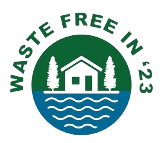
WF23 Impact Report
No 1 – June 2023
Waste Free in 23 (WF23) is an initiative created to end the dumping and burning of household waste. WF23 creates a waste to product circular economy that is community based. It uses established and proven upcycle, recycle and processing techniques in a holistic waste management solution.
As a holistic solution, investments and training on recycling and upcycling solve all household waste problems in a community which makes the WF23 solution asustainable on-site approach, which is adopted into the communities culture.

Community based upcycling and recycling reduces unnecessary emissions and the cost of transport while creating long-term jobs opportunities and other benefits. Due to the lack of municipal waste collection, and if dumping on the land fill, the communities take up responsibility, improve livelihoods and provide dignity – they are multipliers for best-practice climate action.
The 4 solutions that WF23 promotes and facilitates:
Waste Collection is the indispensable first step to reduce plastic pollution in the environment. In the absence of municipal waste collection, hundreds of tons are picked and sorted to reduce plastic pollution in rivers and the environment. Organic, plastic, paper and all kinds of other waste are a resource and part of a circular value chain.
Plastic Upcycling and Recycling solution requires minimal sorting and cleaning and results in the creation of products and generation of income for a community. PET and HDPE and other plastics that can be sold – are sold. Soft plastics, laminated plastics and other plastics – except PVC – are made into panels using a $100 USD heat press. Heat presses are built in the community that will use it. PVC is shredded and added to concrete to replace some of the sand required as an aggregate.
Organic / Food Waste / Manure Processing A combination of Black Soldier Fly Larvae, Anaerobic Biogas, and Composting enables processing of organic waste to maximize benefit for the community where the waste is located and minimizes the volume and maximizes the value of materials that are ultimately sold and are transported from the community.
Pencils for Plastics outreach program where community members through schools and community groups participate in a two hour event where plastic waste is collected from homes and the environment and brought to a central event site. At this site a presentation on the importance of properly disposing of waste and reducing the use of plastics is presented. Gifts of school supplies are given to the participants as a thank you

Waste Free in 23 - January to June Progress Report
Results after 5 months of the WF23 initiative starting:
-
Households that are now waste free: 6,800
-
June 2023 household waste collected and 100% recycled: 45 tonnes
-
Waste collected from Nairobi river and 100% recycled 12 tonnes
-
Communities with equipment/processes to be waste free: 12
-
Communities who are in queue to begin to be waste free: 84
-
Number of students who have received environmental education as part of Pencils for Plastics 3,200
-
Number of schools & education focused CBO who have initiated Pencils for Plastics 11
-
Jobs created 13
-
Salaries provided 3,000 USD/ month tota
-
CO2 avoided Available in August 2023
-
Environmental, Social and Governance (ESG Available in August 2023
Team Members
Waste Free in 23 is supported by a team of Volunteers and Paid Workers
- Gisore Nyabuti, Kenya
- Margaret Kangethe, Kenya
- Sidur, Bangladesh
- Happy Mthulula, Malawi
- Mariah Atieno, Kenya
- Dan Fritschen, USA
- John Ogwayo , Kenya
- Kevin Nyabuti, Kenya
Business Model
The WF23 initiative is designed to be a peer to peer/ crowdsourced platform for communities to learn about, start and ultimately help other communities become waste free. Funding for equipment and waste management subsidies are given directly to the communities (CBOs) who are collecting the wastes by government, NGO, private donors and plastic and CO2 credit organizations.
The WF23 initiative can be supported exclusively by volunteers or joined with a similar initiative that supports the environment, education and aims at empowering communities, waste pickers and refugees.
Sustainability Strategy
The pilot project in Kibera Nairobi has confirmed that the WF23 solution is financially self-sustaining. As the initiative has spread to other communities and countries it has been confirmed that for established groups in the social or environmental sector and especially refugee camps minimal financial support is needed after the initial training and equipment purchase.

In Kibera for example, the cost to process 1 tonne of mixed waste is 90 USD labor, 30 USD shop rental, and $30 USD energy and maintenance. Revenue from sales of BSFL comes to 30 USD per 100 kg, PET plastic bottles, Soft Plastic products typically totals 60 USD total. Plastic recycling credits are available for 100 USD. Sponsorships and funding from other sources can provide income OVER minimum wage to support better living conditions and to enable economic growth.
Road Map
Time is critical for the environment and developing communities world wide. WF23, therefore, is following a parallel development and implementation strategy that leverages the peer to peer structure to both, finding new communities to join in being waste free, as well as developing the optimum training and processes for the different communities.
With this model, and support, we are working to have 5,000 communities world wide to be working to become waste free by the end of 2023. Most of the communities will be just beginning implementation, but with the few established WF23 communities nearly 10 million people will be living a waste free life by the end of 2023.
WF23 supports achievement of the following Sustainable Development Goals (SDG)
6) CLEAN WATER AND SANITATION
8) DECENT WORK AND ECONOMIC GROWTH
9) INDUSTRY, INNOVATION AND INFRASTRUCTURE
11) SUSTAINABLE CITIES AND COMMUNITIES
12) RESPONSIBLE CONSUMPTION AND PRODUCTION
13) CLIMATE ACTION
14) LIFE BELOW WATER
15) LIFE ON LAND
